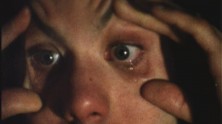
Independents Week: New American Independent Cinema 2007
Short Films
-
Two
Directed by Nick Peterson.
US, 2003, digital video, color, 10 min.
-
Frenesi
Directed by Nick Peterson.
US, 2006, digital video, color, 3 min.
Copy source: Filmmaker
The influence of Japanese master Yasujiro Ozu is everywhere in Peterson’s work, but never more obviously than in Contingent. The story is told almost entirely through a series of carefully composed static shots, in which, as in Ozu’s work, Peterson’s painterly photography creates a series of emotional spaces that function to compare and contrast each of the film’s characters and interactions. Two and Split Pea Soup are both about states of isolation, missed connections, and failures of communication, recurring themes in Peterson’s work, but the first film treats the subject seriously and the second comically. Frenesi, the final Peterson short, was made strictly as a jeu d’esprit. It was planned, shot, and edited in ten hours on a single day, simply for Peterson to have something to do to pass the time and calm his nerves the morning and afternoon preceding the first public screening of Yellow. Even in its off–hand joking way, it shows what a magician of shapes and forms Peterson is.
-
Sullivan’s Last Call
Directed by Francesca Rizzo.
US, 1996, digital video, black & white, 18 min.
Copy source: Filmmaker
There’s always a difference between the kind of movie an actor makes and the kind of movie a non–actor makes. Fran Rizzo is a veteran film and stage actress and teacher of acting. Her film about the accidental reunion of former lovers reveals an actor’s awareness of the emotional slip–slidingness latent in every living, breathing relationship. Her characters play out their identities and their continuously adjusted relationship in a dance of shifting beats, tones, and moods that zig–zag, collide, and bounce around almost too rapidly for a viewer to keep up with. As an established actress who is significantly older than any of the other filmmakers included in the program, Rizzo does not really fall within the “emerging talent” category, but her film is still so unknown both to critics and the public that it deserves inclusion.
Josh Safdie’s movie was made while he was a university film student—perhaps as a rebellion against the rules his teachers undoubtedly drummed into him about how movies should be scripted, lighted, and shot. In this comically zany, freewheeling work, which clearly affiliates itself with Beat Generation values, Safdie (who plays the main character) celebrates the virtues of a life of impulse and a cinematic style that honors spontaneity and improvisation.


























